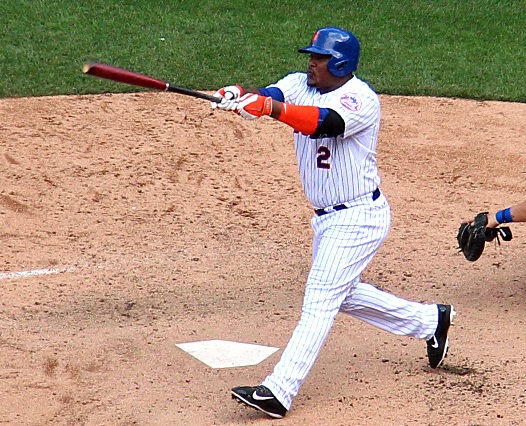When the court of public opinion – aka: social media – weighed in following Friday’s announcement that Mets right-hander Jenrry Mejia had received a lifetime ban from Major League Baseball after a third failed PED test, the verdicts ranged from “sad” all the way up to “good riddance.” But the one common denominator among those chiming in on the lifetime ban of the 26-year-old Tabara Arriba, Dominican Republic native was that no one, not one person, said that the ban was unjustified or the penalty too harsh.

Mejia will forever have the distinction of being the first player in MLB history to receive a lifetime ban for using PEDs. (Photo courtesy of USA Today Sports)
Mejia, who was selected by the Mets as an amateur free agent in 2007, made his major league debut as a 20-year-old on April 7, 2010. Through his five seasons in the big leagues he posted a 9-14 record with a 3.68 ERA while filling the role as the Mets set-up man and occasional closer. But during a 10-month span of what would prove to be the final 10 months of his MLB career, Mejia tested positive for Stanozolol (drawing an 80-game suspension), then tested positive for Stanozolol and Boldenone (drawing a 162-game suspension) and then tested positive for Boldenone, thereby joining Pete Rose as the only other MLB player to be banned for life.
Although we will never know the true answer, the burning question is why would anyone even consider jeopardizing their MLB career – one that they already had in their grasp – by taking PEDs once, let alone three times? And while there are rumors that Mejia claims to have taken the banned substances to help his team win, because of his consecutive suspensions, he hadn’t pitched since July 26, 2015. How is that even remotely helping his team win?
Ironically, Mejia was credited with the win in that July 26 game. It was, of course, against the Dodgers and was won on a 10th-inning walk-off double by former Dodger Juan Uribe at Citi Field. Was Mejia juiced at the time? Judging by his consecutive failed tests, it’s hard to believe that he wasn’t.

The last time Jenrry Mejia set foot on a major league mound was July 26, 2015 at Citi Field against the Dodgers. He was credited with the win after former Dodger Juan Uribe’s 10th-inning walk-off double.
(Photo credit – Ron Cervenka)
What’s even more ironic is that Mejia signed a one-year / $2.47 million contract with the Mets exactly 23 days ago, thus avoiding arbitration. This was actually a pay cut from the $2.595 million he would have made in 2015 had he not been suspended twice.

Fans aren’t the only ones upset with Jenrry Mejia.
(Image courtesy of @BrettAnderson35)
While it is understandable that there are some who see Mejia’s fall from grace as sad, the thing to remember is that his indiscretions were of his own accord – no one held a gun to his head forcing him to cheat – something that he will have to live with for the rest of his life.




 February 14th, 2016 at 6:00 am
February 14th, 2016 at 6:00 am  by Ron Cervenka
by Ron Cervenka  Posted in
Posted in 

I would say that the good news for the Mets is that it’s not a very big loss as they’ve certainly shown that he wasn’t missed much during their surge to the National League Pennant last year. Familia who was a very close friend of Mejia really took up the slack and did a tremendous job.
Unfortunately I have seen this behavior all too often. Some people just cannot handle success, not just in sports but in all phases of life. They cannot explain what is making them sabotage themselves, but they just cannot get out of the way of the runaway train…their insecurities. I do not know Mejia so I cannot chronicle what may be going on in his brain, but it is not stupidity. I would bet that it is some form of depression that needs to stifle success. He doesn’t feel that he deserves success. People want to treat the symptom (drugs), without looking at the real problem. Maybe if someone got him in front of a sports psychologist this could have been avoided. Just my two cents worth from personal observation of similar behavior.
Remember Steve Howe? If he could have stayed off the coke he might be known today as one of the all time great closers.